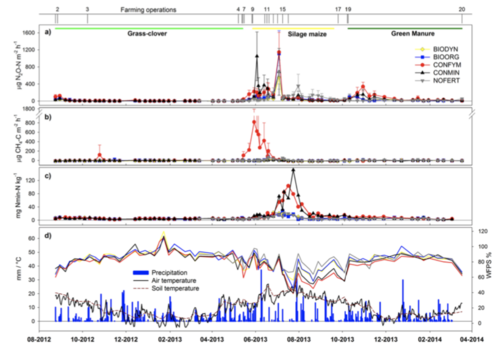Agricultural practices contribute considerably to emissions of greenhouse gases. so far, knowledge on the impact of organic compared to non-organic farming on soil-derived nitrous oxide (N2o) and methane (CH4) emissions is limited. We investigated N2o and CH4 fluxes with manual chambers during 571 days in a grass-clover– silage maize – green manure cropping sequence in the long-term field trial “DOK” in Switzerland. We compared two organic farming systems – biodynamic (BIODYN) and bioorganic (BIOORG) – with two non-organic systems – solely mineral fertilisation (CONMIN) and mixed farming including farmyard manure (CONFYM) – all reflecting Swiss farming practices–together with an unfertilised control (NOFERT). We observed a 40.2% reduction of N2o emissions per hectare for organic compared to non-organic systems. In contrast to current knowledge, yield-scaled cumulated N2o emissions under silage maize were similar between organic and non-organic systems. Cumulated on area scale we recorded under silage maize a modest CH4 uptake for BIODYN and CONMIN and high CH4 emissions for CONFYM. We found that, in addition to N input, quality properties such as pH, soil organic carbon and microbial biomass significantly affected N2o emissions. this study showed that organic farming systems can be a viable measure contributing to greenhouse gas mitigation in the agricultural sector.
PDF: The impact of long-term organic farming on soil-derived greenhouse gas emissions
